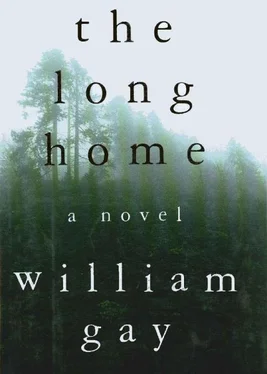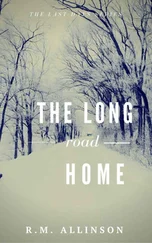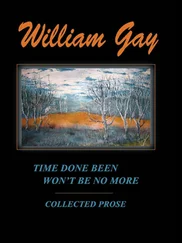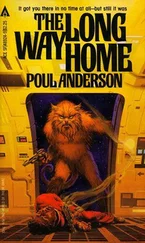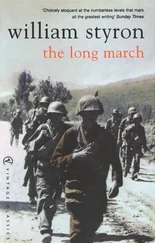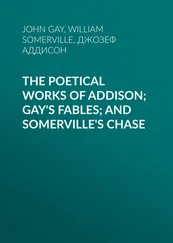“Suit yourself then,” Hardin said. He started the car and began to turn it in the road.
She sat watching her hands fold pleats in her blue skirt. She thought she ought to cry but she didn’t.
William Tell Oliver straightened from the milling goats amidst the halfmusic glangor of the bells to watch the stately passage of the hearse, the corn spilling forgotten from his hands, the polished black of the hearse winking back the midday sun, its sides already dulling with a film of dust.
Hovington, he thought, fascinated by the windows curtained by red velvet, the hearse’s low, sinister configuration somehow profound and appalling against the border of sumac and blackberry briars, diminishing then, content this time with another.
Winer went three times to the Red Diamond Poultry Farm. The first two times there was no one about at all and no sign of Weiss’s car. The chickens were halfstarved. He fed and watered them. The third time was on a Wednesday and Weiss’s car was parked in the drive and the front door was ajar though no one answered his call. He stood uncertainly in the clutter of the porch and after a while he sat in a lawn chair and waited. He felt restless, bemused, time was a commodity in short supply and he must ration his.
Everything seemed to be in disorder. The porch held stacked boxes of white cylinders that turned out to be photographs rolled tightly as window shades. A box was upended and the pictures scattered about the floor. He unrolled one. Another. They all seemed to be photographs of military units, hundreds of soldiers posed before barracks that looked makeshift and temporary, perhaps as temporary and fragile as the men they housed. Only the faces were different, a multitude of them, stern faces with overseas caps cocked jauntily, and then after a while even the faces seemed to merge and lose identity, become multiple exposures of some soldiers posed in limbo, awaiting a ship that would bear them to a war fought long ago.
A noise drew him up through the halfopen door. This room as well was in disorder, suitcases open, clothing strewn about the floor as if kicked there. Weiss lay on the couch. His mouth was open and the room was full of his noisy breathing. A stain fanned out from an overturned wine decanter, a red seeping as if the room had been the scene of gruesome carnage. Weiss slept in his clothes and his boots. The pith helmet lay tilted on the carpet.
When Winer shook him. Weiss’s eyes opened and he started, rose on his right elbow, peering wildly about the room.
“What? What is it? What’s the matter?”
Winer suddenly found himself bereft of anything to say. Weiss’s startled face struggled up from sleep wore an expression somehow akin to madness as if whatever had happened in the last week had marked him, left him deranged.
Weiss had always worn the helmet and looking down at him Winer saw that he was almost bald, the scalp pink and vulnerable through the kinked black hair.
“It’s morning,” Winer said. “The sun’s way up.”
“Fuck the sun,” Weiss said.
He struggled toward a semblance of erectness, abandoned the effort, settled back against the couch cushions. His eyes were open but unfocused, his fingers going awkwardly through all his pockets. At last he came up with the remnants of a pack of Camels, took one out and stuck it in his mouth, and sat without lighting it. His big head was propped on the heel of his hand, his elbow kept sliding off his knee.
“Jesus,” he said. “Oh, Jesus Christ.”
Winer stood in silence peering out the window. The sun fell through the window, a rectangle of merciless light. Where the yard fell away he could see the fence bordering it and through broken greenery the red road itself. He wished he were already on it. When he turned back toward the man on the couch Weiss’s eyes were closed to slits and were watching him speculatively as if surprised to find him still there.
“What do you want anyway?”
“Well, I came to work. To feed and all.”
“There’s not any work,” Weiss said. He had taken up a table lighter and was turning it in his hands this way and that, dropping his eyes to stare at it bemusedly as if uninitiated in its complexities.
“Not any work?”
“That’s what I said. I’m gathering up some stuff and getting out of here. I’m getting the fuck out and I don’t know if I’m ever coming back or not.”
“What about the chickens?”
“What about them? You can have them. Give them to those rednecks around here and let them have a barbecue to remember me by. Give them to our friend Hodges, he wanted them badly enough to try to steal them.”
Winer stood awkwardly without speaking, unable to articulate his thoughts. Finally, he said, “Then you don’t need me?”
“Hell, no. I don’t need you. What would I need you for? I told you, there’s nothing. I’m getting the fuck gone and you may as well do the same.”
“I guess that’s plain enough. I’ll see you.”
“I doubt it.” When Winer was halfway to the door Weiss said, “Look. Goddamn it. For what it’s worth I’m sorry, Winer.” He raised his hands, dropped them. “There’s just nothing. How much do I owe you?”
“Eight dollars.”
“All right.” He withdrew his wallet, sat for a time staring into it so that Winer thought he had forgotten is purpose in extracting it. Then he tossed it to the boy. “Here. You get it. My vision seems somewhat impaired this morning.”
Winer counted out a five and three ones and folded them down into his shirt pocket. He handed Weiss the wallet.
“No hard feelings, Winer. You did me a fine job.”
“No hard feelings. I was sorry to hear about your wife.” Winer turned to the door. When Weiss didn’t reply he went into the hot sunshine.
Dreading what she might have to say he didn’t tell her until the next morning.
“Ain’t I told you?” she wanted to know. “That’s just like him, I always knowed he was no account. Come in here throwin his money around and buildin his big chickenhouses and now where is he? I reckon now you’ll take him up and argue your own mama down. Read a book one time and think you know it all.”
He let the screendoor fall behind him and sat for a time on the doorstep. This was a world of distances, of silence. This was the first day there’d been a hint of coolness in the air. He was surprised to see a few leaves already turning. There was a winey smell to the air, an immeasurable blueness to the sky. He was still sitting there when she came out. There did not seem much else to do.
“Well?” she asked him. “What do you aim to do now?”
He didn’t say anything.
William Tell Oliver had known Winer’s father a long time. He remembered seeing him going to work in the mornings, Oliver as well was an early riser and back before the boy was born and Winer had no horse much less an automobile to ride to work Oliver used to hear him pass about four o’clock in the morning. That was before Winer started carpentering and in those days he used to talk all the way to Big Sinking to offbear at Hickerson’s sawmill all day and even in the summer it would be dusk when he got home, in winter dark would have long fallen. Old even then, Oliver if he happened to be on the porch would hear out of the cold dark Winer’s measured footfalls, see him pass wraithlike, the stride determined, constant. He might raise an unseen hand in the spectral dark. Winer needed no light to find his way, needed only the constant repetitions of his journey to guide him.
He did not know the woman that well. She had been a Hines and like the particular branch of the family she sprang from Oliver thought her dour and overly practical. She had no interest in anything that happened in a book, on the radio, in France or Washington, D.C. Nothing that was not readily applicable to her life. If you can’t eat it, fuck it, or bust it up for stovewood, she’s got no use for it, Oliver thought one time with sour amusement. So when he saw the boy coming up the road in midday he thought, so Weiss has lit a shuck and he’s out of a job. And they have been into it about it.
Читать дальше
